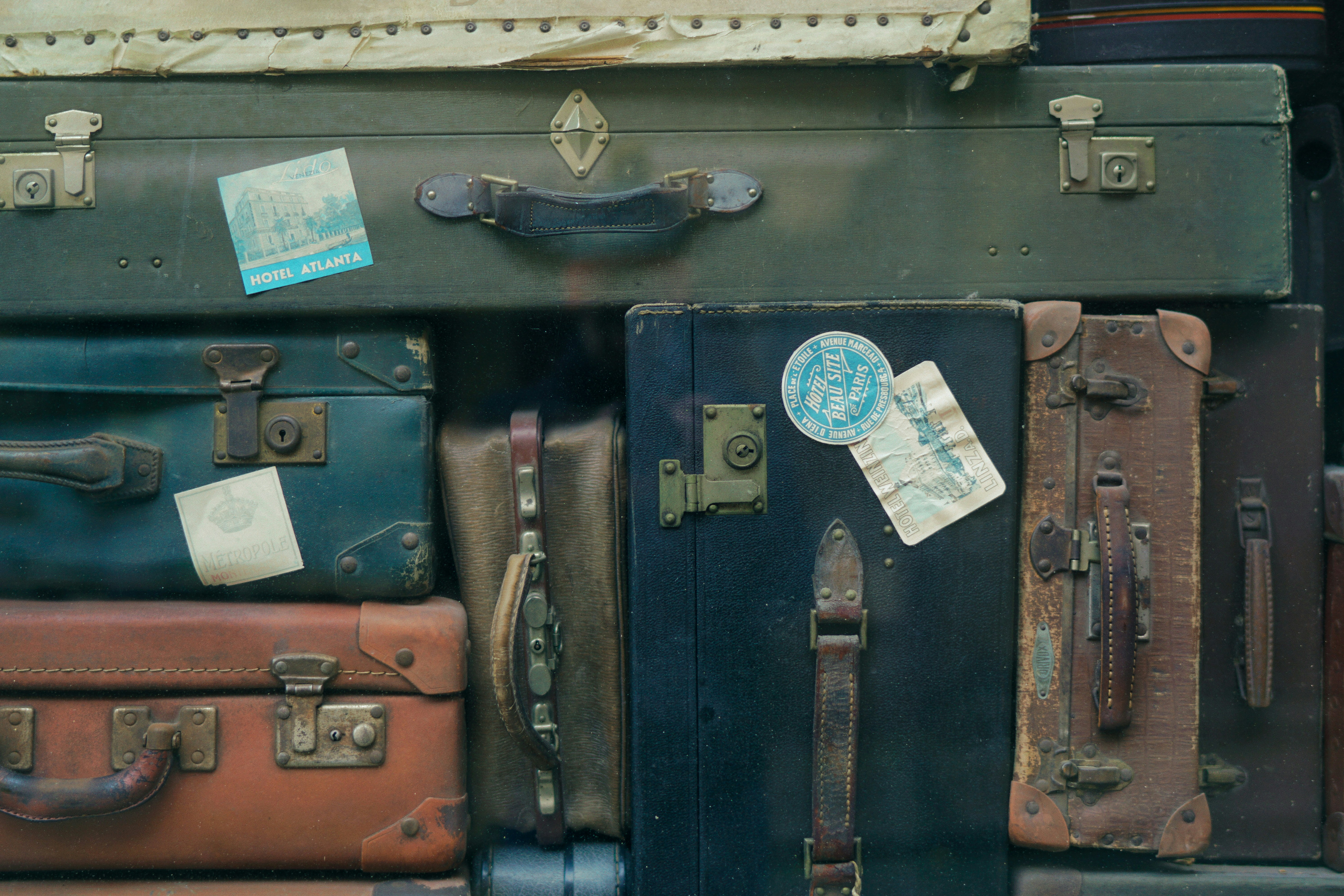Are you in the market for a new suitcase but feeling overwhelmed by the countless options available? Look no further! In this article, we will explore the age-old debate of hard-shell versus soft-shell suitcases. Have you ever wondered which type is better suited for your travel needs? We will discuss the pros and cons of both to help you make a well-informed decision. So, whether you are a frequent flyer or an occasional traveler, let’s embark on this journey together to find out if hard-shell suitcases truly reign supreme, or if soft-shell ones have hidden advantages that you may have overlooked.
This image is property of images.unsplash.com.
Understanding Suitcase Materials
When it comes to choosing the perfect suitcase, one of the most important factors to consider is the type of material it is made from. Suitcases are typically made from either hard-shell or soft-shell materials, each with its own set of advantages and disadvantages. To make an informed decision, let’s take a closer look at the different types of materials available for both hard-shell and soft-shell suitcases.
Types of Hard-Shell Materials
Hard-shell suitcases are known for their rigid structure that provides excellent protection for your belongings. There are several types of hard-shell materials commonly used in suitcase manufacturing:
-
Polycarbonate: This is one of the most popular materials for hard-shell suitcases due to its durability and lightweight nature. Polycarbonate is extremely impact-resistant, making it ideal for protecting your belongings from rough handling during travel.
-
ABS: Acrylonitrile Butadiene Styrene is another commonly used material for hard-shell suitcases. It offers excellent impact resistance and is more affordable than polycarbonate. However, ABS is slightly heavier and may not be as durable as other materials.
-
Aluminum: While less common, aluminum suitcases are known for their durability and sleek appearance. They provide excellent protection for your belongings but tend to be heavier and more expensive than other hard-shell options.
Types of Soft-Shell Materials
Soft-shell suitcases are made from flexible and lightweight materials, providing a certain level of flexibility and allowing for easy storage. Here are some materials commonly used in soft-shell suitcases:
-
Nylon: Nylon is a popular choice for soft-shell suitcases due to its resistance to abrasion and water. It is a lightweight material that offers good flexibility, making it easy to squeeze into tight spaces.
-
Polyester: Polyester is known for its ability to withstand wear and tear, making it a durable option for soft-shell suitcases. It is also water-resistant, but not as much as nylon.
-
Canvas: Canvas is a versatile material that is commonly used in high-end soft-shell suitcases. It is durable, has good water resistance, and provides a classic and stylish look. However, it may be heavier than nylon or polyester.
Durability of Hard-Shell and Soft-Shell Suitcases
When it comes to durability, both hard-shell and soft-shell suitcases have their own strengths and weaknesses. It ultimately depends on your travel needs and preferences. Let’s explore the degree of wear and tear on both types of suitcases.
Degree of Wear and Tear on Hard-Shell Suitcases
Hard-shell suitcases are designed to withstand rough handling and protect your belongings from external impacts. They are less prone to scratches and dents compared to soft-shell suitcases. However, while hard-shell materials like polycarbonate are highly impact-resistant, they may crack or break under extreme pressure or if mishandled by airport personnel. ABS and aluminum suitcases may also show signs of wear over time.
Degree of Wear and Tear on Soft-Shell Suitcases
Soft-shell suitcases are typically more forgiving when it comes to wear and tear. They are made from flexible materials that can endure rough handling. Nylon and polyester are resistant to abrasion, making them less prone to scratches and tears. However, they may show signs of wear in the form of fraying seams or fading colors over time. Canvas suitcases are generally more durable but can be susceptible to water damage if not treated properly.
To ensure the longevity of your suitcase, regardless of the material, it is important to handle it with care and follow manufacturer’s guidelines for storage and maintenance.
This image is property of images.unsplash.com.
Weather Resistance
Another crucial factor to consider when choosing between hard-shell and soft-shell suitcases is their performance in various weather conditions. Let’s delve into how each type of suitcase fares in different weather scenarios.
Performance of Hard-Shell Suitcases in Various Weather Conditions
Hard-shell suitcases, particularly those made from polycarbonate, are generally more resistant to water and moisture. They provide effective protection for your belongings against rain, snow, and accidental spills. However, it is important to note that hard-shell suitcases are not completely waterproof. While they may keep your items dry during light rain or short exposure to water, prolonged exposure to heavy rain or submersion in water may result in seepage through zipper or latch areas.
Performance of Soft-Shell Suitcases in Various Weather Conditions
Soft-shell suitcases, especially those made from nylon or polyester, often have water-resistant properties. They offer a certain level of protection against light rain and splashes. However, their water resistance may not be as reliable as that of hard-shell suitcases. Soft-shell suitcases are more likely to absorb moisture if exposed to heavy rain or extreme weather conditions. Additionally, the zippers and seams on soft-shell suitcases may become potential entry points for water.
It is worth considering the weather conditions of your travel destinations and the level of protection required for your belongings when deciding between a hard-shell and soft-shell suitcase.
Security Features
Ensuring the safety and security of your belongings is paramount when traveling. Both hard-shell and soft-shell suitcases offer specific security features to protect your valuables. Let’s explore the security features commonly found in each type.
Security Features in Hard-Shell Suitcases
Hard-shell suitcases often feature robust security measures that deter theft and keep your belongings secure. Some key security features to look out for in hard-shell suitcases include:
-
Combination Locks: Many hard-shell suitcases come equipped with built-in combination locks, offering an added layer of protection. These locks require a unique code to unlock, preventing unauthorized access.
-
TSA-Approved Locks: Some hard-shell suitcases have TSA-approved locks, which can be opened by Transportation Security Administration (TSA) agents using a master key. This allows for easy inspection without damaging your suitcase.
-
Reinforced Latches: Hard-shell suitcases are known for their sturdy latches that securely fasten the case, making it more difficult for unauthorized individuals to open.
Security Features in Soft-Shell Suitcases
Soft-shell suitcases also come with various security features to ensure the safety of your belongings. Here are some common security features found in soft-shell suitcases:
-
Combination Locks or Padlocks: Similar to hard-shell suitcases, soft-shell suitcases may have combination locks or external padlocks to keep your belongings secure. These locks provide a barrier against unauthorized access.
-
Anti-Theft Zippers: Some soft-shell suitcases feature anti-theft or tamper-proof zippers that make it harder for thieves to open the suitcase discreetly.
-
Hidden Pockets: Soft-shell suitcases often have strategically placed hidden pockets that allow you to store valuable items such as passports or cash away from prying eyes.
Remember, regardless of the security features present, it is important to remain vigilant and take additional precautions to safeguard your belongings while traveling.
This image is property of images.unsplash.com.
Ease of Transport
The ease of transporting your suitcase plays a significant role in your travel experience. Whether maneuvering through busy airports or navigating cobblestone streets, the mobility of your suitcase affects your overall comfort. Let’s examine the mobility aspects of both hard-shell and soft-shell suitcases.
Mobility of Hard-Shell Suitcases
hard-shell suitcases are typically equipped with sturdy wheels and a telescopic handle system, making them easy to maneuver across various surfaces. Most hard-shell suitcases have either two or four multi-directional spinner wheels, allowing for smooth 360-degree movement. The spinner wheels alleviate the strain on your arm compared to traditional two-wheel suitcases, enabling you to effortlessly navigate crowded areas with ease.
Additionally, the rigid structure of hard-shell suitcases ensures they can stand on their own, eliminating the need to constantly prop it up or lean it against something.
Mobility of Soft-Shell Suitcases
Soft-shell suitcases also offer convenient mobility features. They commonly have either two or four wheels, with the four-wheel spinner design becoming increasingly popular. The wheels on soft-shell suitcases allow for easy maneuverability, and the telescopic handle system provides a comfortable grip for effortless navigation.
Due to the flexible nature of soft-shell suitcases, they have the advantage of being able to fit into tight spaces more easily than their hard-shell counterparts. This flexibility makes them particularly convenient when traveling on buses or trains with limited storage space.
Consider your preferred mode of transportation and the types of surfaces you are likely to encounter during your travels when determining the best mobility option for your suitcase.
Storage Flexibility
The storage capacity and flexibility of your suitcase can significantly impact your packing experience. Whether it’s fitting in those extra souvenirs or keeping your belongings organized, let’s evaluate the storage capabilities of both hard-shell and soft-shell suitcases.
Storage Capacity of Hard-Shell Suitcases
Hard-shell suitcases often come with a clamshell design that allows them to fully open into two separate compartments. This design maximizes storage space, making it easier to pack and organize your belongings. The hard exterior walls of these suitcases provide structure to the compartments, allowing for efficient use of space.
Additionally, hard-shell suitcases are less susceptible to compression, ensuring that your items remain undamaged even when the suitcase is fully packed.
Storage Capacity of Soft-Shell Suitcases
Soft-shell suitcases are known for their flexibility and expandability, offering additional storage space when needed. These suitcases often feature exterior pockets and compartments that provide quick access to frequently used items, such as travel documents or electronics.
Many soft-shell suitcases also have an expanding feature that allows you to increase the storage capacity by unzipping a section of the suitcase. This flexibility is particularly useful for travelers who may accumulate more items during their trip or need to separate clean and dirty clothes.
Consider your packing preferences and storage needs when deciding between a hard-shell or soft-shell suitcase. If you tend to pack more and require additional space for souvenirs or other items, a soft-shell suitcase may be more suitable for you.
Aesthetic Appeal
While functionality and practicality are essential, the aesthetic appeal of your suitcase can also enhance your travel experience. With a wide range of design and color options available, both hard-shell and soft-shell suitcases allow you to express your personal style.
Design and Color Options for Hard-Shell Suitcases
Hard-shell suitcases come in a variety of designs, ranging from sleek and minimalist to bold and vibrant patterns. Some manufacturers offer textured finishes or embossed patterns that add a touch of uniqueness to their hard-shell suitcases. The rigid exterior of these suitcases provides a canvas for eye-catching designs that can make a statement as you travel.
Additionally, hard-shell suitcases may have a glossy or matte finish, allowing you to choose according to your personal preference.
Design and Color Options for Soft-Shell Suitcases
Soft-shell suitcases also offer an array of design and color options to suit different tastes and preferences. Whether you prefer a classic solid color, a playful print, or a sophisticated pattern, there is a soft-shell suitcase design for you. Some soft-shell suitcases even have interchangeable covers or panels, allowing you to change the look of your suitcase without purchasing a new one.
The fabric exterior of soft-shell suitcases provides more opportunities for unique and creative designs, making them a popular choice for travelers who want to showcase their individual style.
Consider your personal aesthetic preferences when selecting the design and color of your suitcase. After all, your suitcase is an extension of your personal style and can add a touch of personality to your travels.
Price Comparison
Price is often a deciding factor when it comes to purchasing a suitcase. Both hard-shell and soft-shell suitcases come with a range of price points, depending on factors such as brand, material quality, and additional features. Let’s compare the costs associated with each type of suitcase.
Cost of Hard-Shell Suitcases
Hard-shell suitcases, particularly those made from high-quality materials like polycarbonate or aluminum, tend to be more expensive than soft-shell suitcases. The durability and impact resistance of these materials contribute to the premium price tag. However, hard-shell suitcases made from ABS or other less expensive materials can offer a more affordable option without compromising too much on quality.
Price variations also exist based on factors such as the brand reputation, additional features like security locks, and the overall design and aesthetic appeal of the suitcase.
Cost of Soft-Shell Suitcases
Soft-shell suitcases generally have a wider range of prices compared to hard-shell suitcases. The cost of a soft-shell suitcase can vary depending on the material used, the brand, and the overall durability and quality of construction. Nylon and polyester suitcases are often more affordable, while higher-end soft-shell suitcases made from premium materials like canvas may have a higher price point.
Additionally, factors such as additional pockets and organization features, expandability, and the overall design or pattern can also influence the cost of a soft-shell suitcase.
Consider your budget and prioritize the features that are most important to you when making a decision on the price range you are comfortable with.
Impact on Environment
As travelers become more conscious of their environmental footprint, considering the impact of suitcase production on the environment is becoming increasingly important. Let’s examine the environmental footprint associated with the production of both hard-shell and soft-shell suitcases.
Environmental Footprint of Hard-Shell Suitcase Production
The production of hard-shell suitcases typically involves the use of synthetic materials such as polycarbonate or ABS, which require energy-intensive manufacturing processes. The extraction and processing of raw materials, as well as the production of plastic components, contribute to greenhouse gas emissions and chemical waste.
However, several companies in the luggage industry are taking steps towards sustainability by incorporating recycled materials into the manufacturing process, reducing energy consumption, and implementing responsible waste management practices.
Environmental Footprint of Soft-Shell Suitcase Production
Soft-shell suitcase production also has environmental implications. The production of fabrics like nylon, polyester, and canvas requires the use of chemicals, water, and energy. However, compared to hard-shell suitcases, soft-shell suitcases tend to have a lower carbon footprint due to the lower energy requirements of fabric production compared to the manufacturing of plastic components.
Again, some manufacturers are actively working towards more sustainable production processes by using organic or recycled materials and implementing eco-friendly production practices.
Choosing a suitcase from a brand that prioritizes sustainability and implements environmentally friendly measures can help reduce your overall impact on the environment.
User Reviews of Hard-Shell and Soft-Shell Suitcases
While understanding the technical aspects of hard-shell and soft-shell suitcases is important, hearing from those who have used them is equally valuable. Let’s look at some customer reviews to gauge the overall satisfaction with each type of suitcase.
Customer Satisfaction with Hard-Shell Suitcases
Many customers praise hard-shell suitcases for their durability and protective capabilities. They appreciate the peace of mind that comes with knowing their belongings are well-protected against rough handling during travel. Customers also tend to find hard-shell suitcases easier to clean and maintain due to their smooth exterior surfaces.
However, a few common criticisms include the potential for cracks or breakage under extreme pressure, the heaviness of certain hard-shell suitcases, and limitations in storage flexibility.
Customer Satisfaction with Soft-Shell Suitcases
Soft-shell suitcases often receive positive reviews for their lightweight nature and flexibility. Customers appreciate the ease of storage and their ability to fit into tight spaces. The expandability feature of some soft-shell suitcases is also highly regarded by travelers who require additional packing space.
However, some customers have reported issues with durability, such as wear and tear over time, and potential water seepage during heavy rain or exposure to moisture.
Considering customer reviews alongside your own needs and preferences can help you make an informed decision about the type of suitcase that best suits your travel requirements.
In conclusion, both hard-shell and soft-shell suitcases have their own unique advantages and considerations. Understanding the features, durability, mobility, storage options, security, weather resistance, price, and environmental impact of each type is crucial in making the right choice for your travels. Ultimately, the best suitcase for you will depend on your specific needs, preferences, and travel style. So, weigh the pros and cons and select the suitcase that will make your journeys convenient, secure, and enjoyable.








